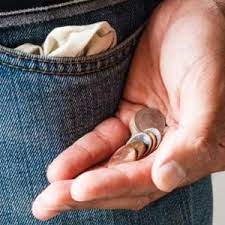Operation Inspiration
By Like many people, I don’t care to carry around tons of small coinage with me. When I’m shopping somewhere, and the total is something like $10.04, I won’t usually have the pennies, so I’ll end up with ninety-six cents in coins as the change I receive after paying with cash. In case you’re not counting, that’s three quarters, two dimes and a penny – if I’m lucky. Of course, some cashiers may give nine dimes and six pennies or any number of other denominational mixtures. What happens to those small coins I don’t want to carry around? They go into a canister I keep on my dresser.
Many homes have a penny jar, and I know people who used to have large vessels of coins stacked up in their homes, presumably for a rainy day. We put these coins aside, and every so often we cash them in for folding money or maybe an Amazon gift card at a Coinstar machine.
One morning, as I prepared to go to shul, I reached into my pocket and felt a large number of coins. Clearly, the day before I’d gotten change once or twice, and now I wanted to get rid of it. The only problem was, since my wife was sleeping, I was walking around in the near darkness and wouldn’t be able to look at the coins to pick out which I wanted to take with me.
But guess what? I had no trouble separating them. I simply stacked them in my pocket, then put my thumb and forefinger on the edges of the largest coins, the quarters I wanted to take. I let the smaller coins fall away, making it easy to scoop them from the bottom of my pocket and toss them into my coin jar. I’m sure you’re riveted by my numismatic exploits, but what is this story doing here, in a column dedicated to inspiration?
Well, what came to mind was the fact that the easiest way to identify the coins was by feel, not by sight. I didn’t have to examine them and then pick and choose, rather they almost sorted themselves. Then, by holding onto what I wanted, the rest fell away.
It made me think about an expression – the measure of a man. It refers to what a person is made of, their character and how they act under pressure. The quarters I was looking for are useful for tzedaka, parking meters, and vending machines. The pennies, nickels, and even dimes are less suited for these purposes. People, too, have certain maalos and chisronos, and the easiest way to sort them is by seeing who they stick together with.
Perhaps not coincidentally, the quarters are larger and have a higher value than the other coins. When it comes to people the same thing applies, and usually their greatness increases in proportion to their values. So, if I can identify coins by their size, and sort them out that way, then if I want to know what type of person I’m dealing with, I can simply gauge by who they choose to associate with.
If they gravitate to Talmidei Chachomim, to ehrliche people, and those who are careful with their speech, it’s pretty safe to assume the person fits with that group. Like a penny hiding in between quarters, they wouldn’t be able to stay close unless they either acted that way, or have the desire to and are moving in that direction. On that basis, you can feel comfortable building a relationship.
If, on the other hand, the person you’re wondering about hangs around with people who are arrogant, unethical, or generally selfish and mean-spirited, the odds are pretty good that those midos will surface in the person you’re considering a potential friend. If that’s the case, you might want to consider tossing them in the can for later, and only keeping the other type close at hand.
Another important factor to consider when deciding to whom you will become close is right there on the coins we’re discussing. A law passed in a Joint Resolution by the 84th Congress and approved by President Dwight Eisenhower on July 30, 1956, requires that “In G-d We Trust” appear on all American currency. Yes, those meaningful words are emblazoned on everything from the humble penny to the sought-after hundred-dollar bill. I think it’s no coincidence that money, which can make people feel proud and forget the Ribono Shel Olam, has a reminder stamped right on it that we do not trust in our wealth, but in Hashem.
If the person you’re talking to doesn’t make reference to Hashem in his or her speech, with frequent Baruch Hashems, Im Yirtzah Hashems, or as my holy friend Ben says, “Yishtabach Shemo La’ad!,” then maybe it’s time for a change. A person who is thinking about Hashem will also think about how he acts towards Hashem’s children, and that’s key. So, the next time you’re trying to get a picture of who someone really is, think about the money in your pocket. It’s not as difficult to decipher people as you might think. You could say that it’s simply “common cents.”
© 2021 – All Rights Reserved
Did you enjoy this column? Feedback is welcome and appreciated. E-mail info@JewishSpeechWriter.com to share your thoughts. You never know when you may be the lamp that enlightens someone else.






